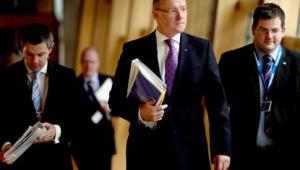By Keith Aitken in Edinburgh | 21 September 2011
Finance Secretary John Swinney’s Scottish budget, announced today, includes a £500m boost for preventive spending, a £0.75bn transfer of funds from revenue to capital projects, a further one-year freeze on public sector pay, and a determined drive for efficiency savings.
Swinney has also revived a controversial plan, defeated in the Parliament a year ago when the administration was in a minority, for a supplement on business rates. The ‘Tesco Tax’ will be imposed on big retailers selling alcohol and tobacco products.Setting out his Budget for the coming year, and spending plans for the two subsequent years, Swinney upheld major spending commitments from last year’s Scottish National Party budget. This is despite the £3.3billion real-terms reduction in Scotland’s budget under the UK government’s Spending Review.
The commitments include a five-year council tax freeze, no tuition fees and minimum income guarantees for Scottish students, free medical prescriptions, a ‘social wage’ for low-paid workers in public services, maintenance of health board budgets in real terms, and increased numbers of frontline police and modern apprenticeships.
But Swinney confirmed that the Scottish Government was likely to have to impose increased pension contributions on local authority employees in line with those for civil servants, after the UK government threatened to claw back the money if it didn’t.
Reactions have so far focused on how Swinney will afford his
spending promises, with opponents sceptical both about the scale of efficiency
savings he envisages and about his expectation that local authorities can be
persuaded to use their borrowing powers (which the Scottish Government itself
lacks) to bring forward capital projects and thereby boost economic growth.
Immediate reactions focused on how Swinney would afford his spending promises. Critics were sceptical about both the scale of efficiency savings he envisages and his expectation that local authorities can be persuaded to use their borrowing powers (which the Scottish Government itself lacks) to bring forward capital projects and thereby boost economic activity.
Council leaders accused him of ‘spinning’ a higher level of municipal acquiescence than had yet been agreed, and claimed that the combination of reduced allocations and increased service demand would leave local authority budgets with a 15% shortfall over the period of the plans.
Detailed figures confirmed that some central programmes would also have to take hits to help pay for the headline pledges: notably housing and regeneration, local authority capital allocations, the third sector, enterprise, further education and legal aid. Ministers are denying themselves a pay rise for the fourth successive year.
The Scottish Government’s determination to boost capital spending – despite a 36.7% cut in the capital budget from Westminster – also depends on the success of novel funding mechanisms. These include the non-profit distributing model and bodies such as Network Rail borrowing against its asset base to build infrastructure.
Swinney told MSPs that the government had saved £2.2bn in the past year, £673m ahead of target. He added that he was confident of further savings to come from reforms such as the creation of single national police and fire services, streamlined IT systems and sales of public buildings.
‘Our decisions are designed to equip Scotland for economic recovery, for sustainable public services and for new opportunities for our people,’ he told MSPs.





















